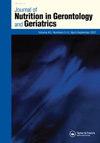食用油性鱼类与身体虚弱。厄瓜多尔沿海农村经常食用鱼类的人群研究(Atahualpa项目)
Q3 Medicine
Journal of Nutrition in Gerontology and Geriatrics
Pub Date : 2020-01-02
DOI:10.1080/21551197.2019.1681343
引用次数: 11
摘要
油性鱼类被推荐作为健康饮食的一部分,因为它们富含长链ω-3多不饱和脂肪酸(ω-3 PUFAs)、蛋白质和其他营养素。有初步证据表明ω-3 pufa在预防肌肉减少症(虚弱的主要成分)方面具有有益作用。在这项研究中,我们旨在评估生活在厄瓜多尔沿海农村社区居住的老年人饮食中油性鱼类摄入量与脆弱性测量-埃德蒙顿虚弱量表(EFS)评分之间的关系。共有363名Atahualpa居民被纳入研究。平均每周吃鱼量为8.8±5.2次,平均EFS评分为5±2.8分。线性回归模型显示,油性鱼类摄入量与EFS评分之间没有关联。然而,根据参与者的年龄中位数和鱼摄入量(五分位数)分层的相互作用模型显示,这两个变量对EFS评分都有显著影响(ß系数= 0.104;95% ci: 0.003-0.206;p = 0.044)。在鱼类摄入量最低的五分之一,年轻人的EFS得分低于老年人。随着食用油性鱼类的增加,60-69岁受试者的平均EFS评分边缘逐渐降低,但在≥70岁的受试者中基本不受影响。似乎油性鱼的摄入对年轻人的虚弱状态有积极的影响,但在老年人中被年龄的影响所取代。本文章由计算机程序翻译,如有差异,请以英文原文为准。
Dietary Oily Fish Intake and Frailty. A Population-Based Study in Frequent Fish Consumers Living in Rural Coastal Ecuador (the Atahualpa Project)
Abstract Oily fish are recommended as part of a healthy diet due to their high content of long-chain omega-3 polyunsaturated fatty acids (ω-3 PUFAs), proteins, and other nutrients. There is preliminary evidence of beneficial effects of ω-3 PUFAs in the prevention of sarcopenia (a major component of frailty). In this study, we aimed to assess the relationship between dietary oily fish intake and a measure of frailty – the Edmonton Frail Scale (EFS) score – in community-dwelling older adults living in rural coastal Ecuador. A total of 363 Atahualpa residents were enrolled. The mean fish servings per week were 8.8 ± 5.2 and mean EFS score was 5 ± 2.8 points. A linear regression model showed no association between the amount of oily fish intake and EFS scores. However, an interaction model, with participants stratified according to their median age and fish intake in quintiles, showed a significant effect for both variables on the EFS score (ß coefficient = 0.104; 95% C.I.: 0.003–0.206; p = 0.044). At the lowest quintile of fish intake, younger individuals have lower EFS scores than their older counterparts. As the consumption of oily fish increases, mean EFS scores margins were found to be progressively reduced in subjects aged 60–69 years but were largely unaffected in persons aged ≥70 years. It appears that oily fish intake has a positive effect on the frailty status of younger subjects but is superseded by the effects of age in the older population.
求助全文
通过发布文献求助,成功后即可免费获取论文全文。
去求助
来源期刊

Journal of Nutrition in Gerontology and Geriatrics
Nursing-Nutrition and Dietetics
CiteScore
2.20
自引率
0.00%
发文量
13
期刊介绍:
The Journal of Nutrition in Gerontology and Geriatrics publishes original research studies that are directly relevant to clinical and community nutrition issues that affect older adults. Epidemiologic and community-based studies are suitable for JNE, as are well-controlled clinical trials of preventive and therapeutic nutritional interventions. The Journal of Nutrition in Gerontology and Geriatrics invites papers on a broad array of topics in the nutrition and aging field, including but not limited to studies of: preventive nutrition, nutritional interventions for chronic disease, aging effects on nutritional requirements, nutritional status and dietary intake behaviors, nutritional frailty and functional status, usefulness of supplements, programmatic interventions, transitions in care and long term care, and community nutrition issues.
 求助内容:
求助内容: 应助结果提醒方式:
应助结果提醒方式:


